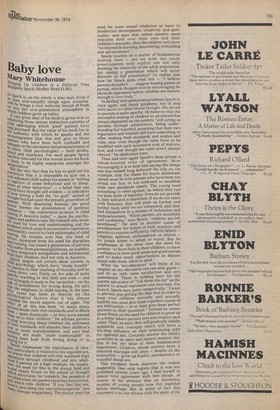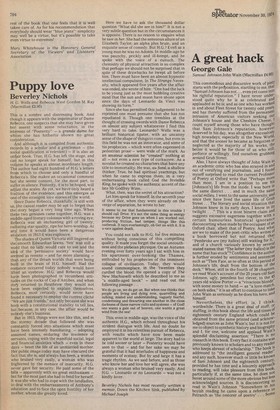Baby love
5/1„ ary Whitehouse b-ringing Up Children in a Difficult Time uenjarnin Spook (Bodley Head £1.95) ni3r Peek is, on the whole, a wise man. Even if fld does over-simplify things upon occasion. he brings a very welcome breath of fresh w _a'r into the over-pressurised atmosphere in hich children grow up today. tabverY great deal of his book is given over to child very those almost instinctive patterns of uPbringing which 'good' parents have t?,ng Practised. But the value of his book lies in e"le authority with which he speaks and the r,tieetlragement that this will give to those riarents who have been both confused and snrlhaPpy at the strictures and permissiveness of s101IY child psychologists both profesCnal and charlatan. For such people Spock 'i'as little time and for this reason alone his book likelY to be highly unpopular amongst the Progressives.' e_But the very fact that he has to spell out his wunveliction that it is impossible to turn out a • to l-adjusted child unless the parent is "willing proapProve of some behaviour and to disapw 'e of other behaviour" a belief that one '(;ceuld have thought self-evident is indicative t4 how strong a hold the "no guilt" school of n-ought has had upon the present generation of ,arents. With disarming honesty the good uoctor blames the phenomenon of parental thes', thes', 0„t,"-grloY "the commonest problem in child io-':ung in America today" upon the psychothe and pediatricians like himself who made 0"r need for love and understanding and the and
°I3lerns which arise from excessive repression •
rearihostility central to their philosophy of child He realises now that this kind of aal'ee, separated from the need for discipline whotraining, has raised a generation of parents , u fsuffer from parental guiltiness, an inability ,_ frrs 4Ce from antagonism and withdrawal slu their children. And not only in America. thol?Pck singles out certain ideas current in fe,."° Psychology which have "made trouble" co' Parents in their teaching of morality and he s,,_trles down very firmly on the side of quite 110 tile teaching in this field and even and strangely it reads in the 'seventies on the th,`t nr Punishment for wrong doing. He says fet the emphasis in child rearing in the past Psych Y Years has been so heavily on the eto °logical factors that it has almost effeWded the moral aspects out of sight. The narent et of all this has been "to make many • the s doubt their own standards and to dilute the„n! quite drastically as they have passed to ou to their children." He advises parents Of t,ueiL-°P worrying about Whether the strictness ir_r standards will alienate their children's or cause maladjustment, and says that ha.vid!roo are made "more comfortable" ins lig been kept from wrong doing or in vng for it hs;:sPock emPhasises the importance of ideabt, Particularly in relation to the opposite sex, `,,Warns that children will only maintain high `115
7-1)11-ations through childhood and into adultcKi i
sise„ f Parents set a high example. He emphawo,.. the need for this in the sexual field and which clearly frown on the school of thought the „`",,advocates, for instance, the presence of ah,`-nild when the parents practise intercourse, have Which tells children "if you feel like sex, tha, lt, providing you use contraceptives" (see
teenage magazines). The doctor sees the need for some sexual inhibition as basic to intellectual development, creativity and spirituality, and says that unless parents exert restraint both over their own and their children's sexuality, then the children will show' "no interest in learning, discovering, in building and advancement." Spock touches on a matter of fundamental interest here are we with our crude preoccupation with explicit sex not only draining the creativity of the adult population, but raising a generation which will never discover its full potentiality? To realise just how far Spock goes, read this "I believe parents shouldn't. . suggest kissing games at parties, which cheapen love by encouraging its physical expression before children are mature enough to love truly." In dealing with adolescent problems Spock is, once again, and thank goodness, out of step with much so-called liberal thought. His advice to parents is quite specific. He believes that the successful rearing of children to adulthood has always depended on the parents "still acting as parents through adolescence, being understanding but watchful, assuming that their own experience and wisdom still have something to offer, making their standards and wishes and rules clear even though the rules have to be modified with each successive year of matura-, tion, and even though the rules aren't always obeyed." No abdication here.
Time and time again Spock's ideas arouse a whole-hearted echo of agreement. How encouraging it is to hear him saying the things one has oneself long believed! He tells us, for example, that the blame for much adolescent unrest must lie with parents who have been too afraid, too lazy or too confused to establish their own standards clearly. The young need something to rebel against, on which they can cut their teeth of maturity. If we do not provide it, they will seek it elsewhere. If we do not react with firmness, they will push us further and further back until we are exhausted, and they find themselves in a morass of indecision and purposelessness. "When parents are uncertain and vacillating," says Spock, "children are left bewildered." He sees as another cause of bewilderment the failure of both teachers and parents to express sufficiently definite beliefs religious,
spiritual, philosophical or ethical for youth either to adopt or reject. But he emphasises at the same time the need for parents "to have faith in their children, to have confidence in their good sense and good morals and to make many opportunities to discuss issues with them, adult to adult."
What the 'sex-educators' will think of his chapter on sex education one can only guess and do so with some satisfaction and wry amusement. There is nothing here for the solemn advocates of "Tell-them-the-lot" as the answer to sexual repression and neuroses. Far from it. Spock says, quite categorically: "I want to prevent you getting the idea that in order to keep your children mentally and sexually healthy You must give them a perfect course of sex instruction or at least give them perfect answers to their questions." Instead he comes down firmly on the need for children to grow up in a home where parents love and respect each other. Then, he says, they will gradually imbibe standards and concepts which will have a life-long influence on their relationship with
the opposite sex. Certainly answer the child's questions in an open and natural manner, but that is not the issue of most fundamental importance. Children whose parents have a distorted marriage will often despite all the instruction _ grow up fearful, unresponsive or resentful about sex. This excellent book deserves the widest readership. One only regrets that it was not published twenty years ago. I find myself in almost total agreement with him except, of course, in his pleasure that an increasing number of young people now live together before marriage. But in point of fact this statement is so out of tune with the spirit of the rest of the book that one feels that it is well taken care of. As for his recommendation that everybody should wear "blue jeans": simplicity may well be a virtue, but it's possible to take even virtue to extremes!
Mary Whitehouse is the Honorary General Secretary of the Viewers' and Listeners' Association











































 Previous page
Previous page